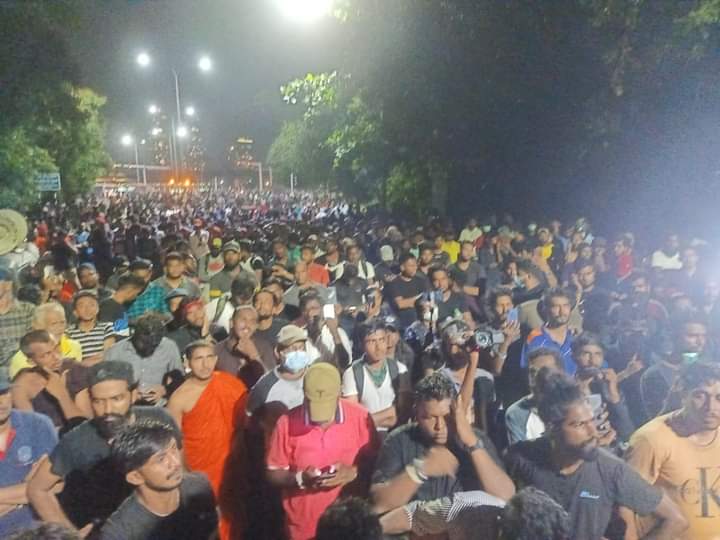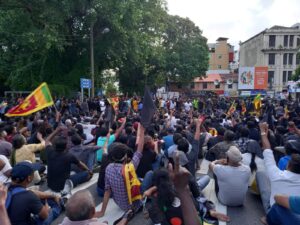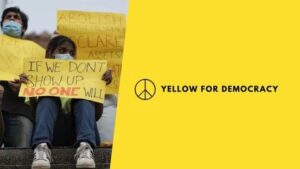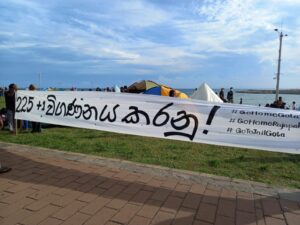
University students are not new to political dissent and action, and the current wave of anti-government protests in Sri Lanka have been no exception. They have been actively denouncing many actions of the current government since early on, independently as well as in solidarity with other movements. In this interview, Hasini Lecamwasam from Polity speaks to two student participants (on condition of anonymity) following two particularly contentious occasions i.e. 3rd April when an island-wide curfew was declared following the Mirihana mayhem, and the next, a month later, on 5th and 6th May, when the Inter University Students’ Federation (IUSF) converged on Parliament. The students talk about their specific protest experiences, the larger reality in which university students find themselves at the current moment, their vision for the country and themselves, as well as the general feeling of hopelessness with which they grapple.
Q: Tell me about yourselves.
University of Peradeniya (UP): I’m a final year undergraduate at the University of Peradeniya. I have been participating in protests and other kinds of political action ever since I joined university. Initially they were limited to issues inside the university such as hostel facilities and other things of common interest. During the first year, we mostly participated due to pressure [from the Students’ union]; but later on, I realised if you don’t speak up for your rights, nobody else will. It’s not about this person or that, but rather about collective claims. So after the first year, my participation was voluntary and very much because of the conviction that we need to collectively struggle for collective achievements. I’m not part of the Students’ Union because it takes up a lot of time, but I do support and participate in any political action for common things.
University of Kelaniya (UK): I’m also a final year undergraduate. I study at the University of Kelaniya. Like my friend here, I have also been participating in protest activities since my first year. And similar to her, I also initially went because we were told to. Not that there was any pressure to do so. But the Union or faculty seniors would come and encourage us, saying things like ‘these are problems that affect all of us’, or ‘if we don’t participate, who will’ and so on. After a while, that collective consciousness she spoke about, sort of invariably grows within you. It has now come to a point where even in our fourth year, when most people opt out of these activities because of academic commitments, we still go. We feel the need to. We can’t turn away from it.
Q: What kind of political action have you been part of, at the university?
UP: I remember participating in many protests in front of the university Senate Hall. The first one was when we were in the first year, asking for an increase in the Mahapola scholarship monthly stipend. In the second year, we participated in a protest to get a proper Management Faculty for the university. We’re still agitating for this, to no avail. COVID19 hit when we were in our third year, and many students struggled a lot because of the sudden shift to online education. Amidst all of that, the Mahapola stipend also halted for about 3-4 months. It was very difficult for many. We really felt the need to raise our voices at that point, because the financial need was so strong. Then the final protest before this crisis was over online education, when the university decided to conduct exams on-site. We felt it was unfair for lectures to have been conducted online, and exams on-site, because many were grappling with access issues. So we wanted the Faculty to consider at least a month of on-site lectures, if on-site exams were non-negotiable; we picketed in front of the Dean’s office, but that didn’t happen.
UK: I have been part of protests organised by the Students’ Union of my university in collaboration with the IUSF. Many of them were held in front of the University Grants Commission [in Ward Place, Colombo 7]. Once we went there to protest the decision to make 80% attendance mandatory at the University of Kelaniya. We felt it was stifling our freedom, and that it went against the ethos of a university. We also protested against the Prevention of Terrorism Act (PTA) last year, in solidarity with civil society organisations, because it is a blow to human freedom and dignity. Mahapola of course I think got all of us on the streets: firstly to get an increase in the stipend, then just to get the stipend at all, when it was stopped.
Q: Let’s talk about the recent spate of protests. What made you participate?
UP: Like I said, after the first year, I had developed a consciousness about the importance of struggling for collective aims, because they have implications for us all. So I anyway wanted to participate. But it was particularly after students started getting arrested for protesting that I really wanted to join these protests. We were on the streets well before these mass protests broke out, from the time when IUSF people got arrested.
UK: I’m actually not a very political person. In fact, I vote at elections only out of obligation. My only politics is that welfare should continue, particularly free education. I don’t know where I’d be, and where many of my friends would be, if not for free education. But this situation has come to a point where it’s affecting everyone in very real ways, and we just absolutely need to be political. We don’t have a future. There aren’t any jobs; even those already working are being laid off, so how will we find work?! Now government servants are asked to stay in service until they’re 65! This will limit our opportunities even further. So we can’t look away anymore.
Q: Can you tell me a little bit about your experience at the more recent protests you participated in?
UP: I will talk about the protest at the Galaha junction on the 3rd of April, when they declared curfew. It was organised by the Students’ Union, and we were notified over their WhatsApp group as usual. On the morning of the day, we had trouble getting permission from the Warden to leave because curfew had officially been declared. Then when we contacted the Union to report the situation, some office holders came to convince the Warden to let us go. She was still reluctant; said she couldn’t take responsibility if anything happened. But after a while she sort of fell silent, so we made use of it and came out. I heard that in another residence hall, the Warden had firmly refused permission, even to the Union reps, and then someone high up from the Faculty had intervened (I’m not sure who it was), and then only had they been given permission. Anyhow, we all then walked up to the Galaha junction; we got there by around noon. I’m not sure how many people were there, I’m guessing around 500. They were mainly made up of hostellers. Some were carrying placards they had prepared earlier, but I didn’t have one. I remember one read ‘we have tears, just give us gas’ (laughs). The Union on the previous day had sent slogans to be printed or copied down and brought with us; it was to chant. So we were doing that for about 10-15 minutes, when some students started trying to dismantle the barricades preventing us from getting on to the main Kandy-Colombo road. That’s when the police reacted, first with water and then with tear gas. Some university marshals were there, they tried to intervene and stop it, but nothing happened. I mean, I don’t think the police knew they were marshals. Ultimately it stopped when students surrounded the trucks that carried the water and the tear gas. We didn’t get affected by all this as we were at the back. Then the president of the Union made a speech after a while, and it all wrapped up around 3.15 p.m. I couldn’t participate in any of the recent IUSF protests, because I was finishing up my senior thesis, and couldn’t afford to take time off to go to Colombo. We had our plates full trying to find the required stationery, and then the money to pay for them, to print the thesis!
UK: I went for the IUSF protest in front of Parliament, held on the 5th and 6th of May. Everyone was asked to come to the J’Pura University as the meeting point. From there, we marched to the vicinity of Parliament. Obviously we couldn’t go beyond a point, because it was heavily barricaded. As we attempted to bring down some barriers, the water cannon and tear gas attacks started. We noticed that the tear gas was stronger than what they usually use. We were finding it really difficult to overcome its effects. Students were running around, looking for water for relief. The beautiful thing was that traffic on the road stopped to make way for us. Can you remember, not so long ago, people used to really hate IUSF protests? They used to scold us for disrupting things. I remember those days whenever we had a protest, we used to carry our own water to drink, sometimes in polythene bags. But now, people are giving us food and water! They’re starting to see that we were right.
Q: What do you mean?
UK: So earlier, when we would try and call attention to how the rulers are ruining the country, how they’re eating into welfare, how they’re just looking out for themselves, we weren’t taken seriously. We were just mostly considered to be a nuisance. But now people are seeing those things for themselves, and realising we were right all along.
Q: Can you speak a little more about your experience at the protest in front of Parliament?
UK: I remember employees in all the government buildings [Sethsiripaya complex] around us coming out and clapping for us. It was exhilarating to see that. Everybody was supporting. When we were gassed, I ran to a nearby faucet to use the water. It belonged to the adjacent boutique, but turned out the owner had closed all the pipes of his faucets. Then he saw me trying to use it, rushed over, and opened all the pipes so all the faucets were functioning! Then another lady also rushed to my side, and helped me wash my face and eyes. Then we – I was with a friend – tried to rejoin the protest, but they had just been gassed again. My friend was in a pretty bad condition, tearing up quite a bit. I remember a police officer rushing past, and shouting general instructions to wash our eyes well! He didn’t stop or look at us, but he was definitely looking out for us!
Q: What kind of change do you want to see happening as a result of these protests?
UP: It’s not enough to change the people. We have been responsible for our own governing for more than 70 years now; the issue is clearly systemic. It is because of the system that the ones in power currently are in power. By system I mean both the electoral system [Proportional Representation (PR)] and Executive Presidency. The PR system increases competition both between and within parties, pushing candidates to spend more on campaigning, paving the way for corruption and patronage. The Executive Presidency leaves the one in charge completely unaccountable, allowing them to manipulate politics as well as institutions. This same lot will come into power again if we don’t change the system.
The unelected branches – like the civil service, judiciary, and military – are also highly politicised. Look at how [criminals like] Duminda Silva and ‘Choka Malli’ were released. It’s clear that the judiciary is under pressure from politicians. Even military intervention is more because the government wants it that way. I think the role of the military is of course dependent on who is in power, because they are simply following orders.
I don’t think we can go for elections at this point; we can’t afford it. The best alternative is an interim government. We need experts to pull it off. I would say for at least six months to a year, until we sort out the basics like food, medicine, and fuel. I understand it’s a risk to have non-politicians, especially those not elected by the people, in power, but that’s what the people are asking for. It’s a risk, yes; we don’t know how they will fare, but it’s the best we can do at the moment.
In the meantime, to put democracy right, constitutional reform is needed. The President needs to be held accountable. And no dual citizens in Parliament! That’s how Basil Rajapaksa got in! Then the National List needs to be reserved exclusively for intellectuals, not those who lose at elections; people have clearly rejected them. I would even completely scratch the presidential system, and have a parliamentary one, because it’s evidently not working no?
I think we should get rid of everything else that’s not working as well. For instance, look at our local government system, and even Provincial Councils. I mean, what’s the point? Complete waste of resources. If these tiers of government are given actual, meaningful powers and the autonomy to exercise them, they would make sense. But otherwise, might as well just dismantle the whole thing. We need reform from the grassroots; this entire system is a burden unto itself. Politicians just use the bureaucracy for their patronage programmes, so now you have a whole lot of officers whose services you wouldn’t ever even require! Think about the Divisional Secretariat/Assistant Government Agent office for example. So many unnecessary positions. All this because politicians want to put in their people. And then they say there’s no way to take us in! That’s how they got into power also, by giving out State sector positions wholesale. There needs to be a system. Otherwise we will always be looking for jobs. There is no hope at all, I think we have hit rock bottom. I’m thinking of migrating; many are actually. Never thought of leaving the country, never thought it would come to this.
UK: Actually I don’t like politics at all, so my concern is economic. What I want out of these protests is for all these problems to go away. Look at how much people are struggling. Their salaries remain the same, but prices keep going up. Transport costs are sky rocketing, food is expensive, fuel prices keep going up. The salary is no longer enough for most people. I want people’s welfare to be sorted; welfare in general as well as specific aspects of it like free education and health. For me, sorting out the economy is the most important part, and that’s what I hope the protests will primarily achieve.
Q: How do you think the current situation affects university students particularly?
UP: When we were in our first year, lunch was Rs.25, now it’s Rs.75. But Mahapola is still Rs.5000 a month. We can at least depend on our parents, we can ask them for money. But some of us support our families using our Mahapola money. My roommate’s father is a kidney patient; he’s unable to work. So she sends money home every month out of her Mahapola stipend. This spike in the cost of living is unbearable, that is why people agitate. Stationery has become so expensive! Prices of everything have doubled. Even the private sector has cut down on expenses to economise. So they try to squeeze the maximum out of those already working at their places. I know for a fact that garment factories are like that, because I used to work at one and have contacts there. They lengthen the shifts, cut down on leisure time, refuse leave, all of that.
UK: I have similar experiences. The price of everything has gone up. We’re spending much more on boarding fees, transport, food, etc. A packet of lunch is now Rs.120 at Kelaniya. Most of us only have one meal a day. Most of the boys are surviving on one meal a day, I know this. Many are also looking for part time jobs to support themselves. You can’t always be asking for money from home. Parents are already buckling under the pressure. Sometimes when they ask us whether we have eaten, we lie and say yes because we can’t tell the truth. They do everything they can. Mahapola stipend also doesn’t come regularly now, so that’s no use. Studying is out of the question with all these problems, and power cuts anyway get in the way. It’s quite hopeless.
Q: In this kind of economic hardship, do you think the current protests can be sustained?
UP: They will. Definitely. People are now seasoned. They take shifts to be at the protests! The trick is to sustain them. After the Galaha protest, I joined one in Warakapola close to where I live. There was another university protest on the 8th of May, but I missed that because I had come home for the [Sinhala/Tamil] New Year break. I think we should, and we will, keep at it.
UK: I think it depends on how invested you are in this. For instance, IUSF people are seasoned protestors. So they will continue at it no matter what. But I’m not so sure about other people, who are getting into this for the first time in their life. Who knows, they might even pull out after a while. But it’s very difficult to predict anything in this kind of situation. I’m just thinking about all those people currently not taking part, the ones who might actually be against all these protests. Even for them, it’s difficult not to see what’s happening now right? So they might even join the protests. The way this is going, I don’t think it’s possible for anybody to not see or ignore things anymore. So the enthusiasm to be on the streets will continue, most probably.



